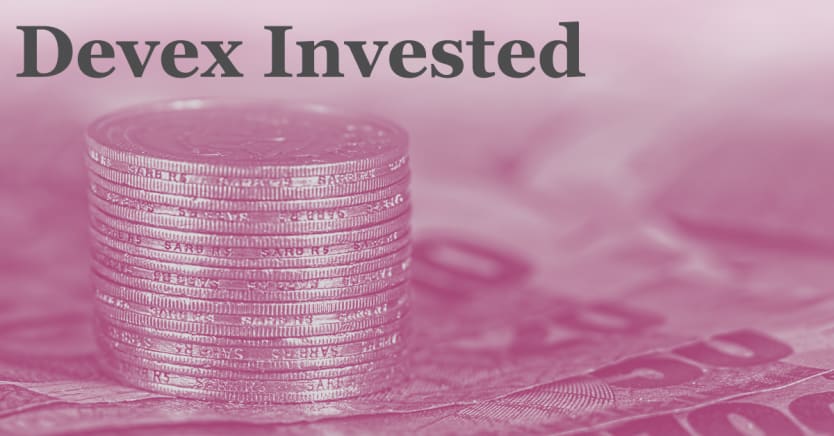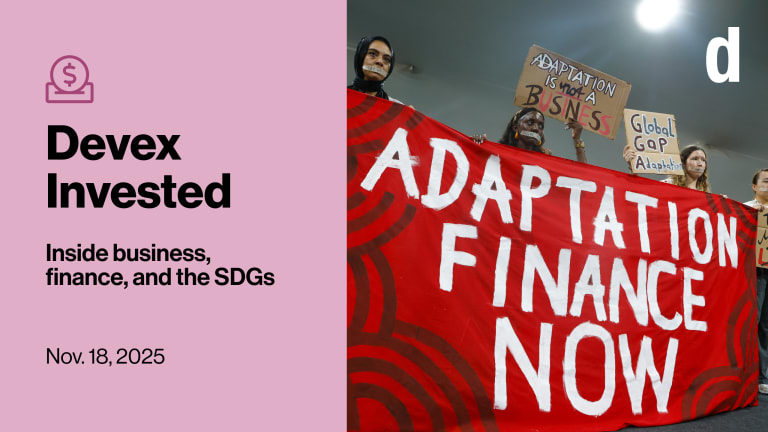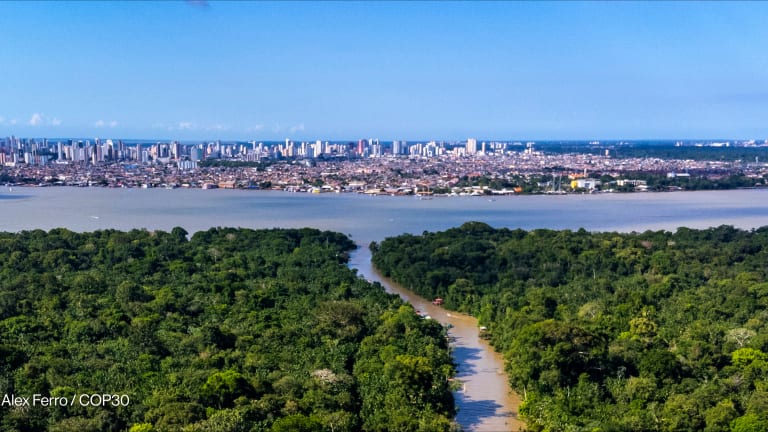
While my colleagues are busy in Scotland covering COP 26, I’m watching from Washington as the speeches and announcements roll in. There’s the deal to end international fossil fuel financing, a new exchange-traded fund for climate, and a pledge to align $130 trillion with the Paris Agreement — but we’ll get into some of those details later.
This is a preview of Devex Invested
Sign up to this weekly newsletter inside business, finance, and the SDGs, in your inbox every Tuesday.
I’ve been thinking about the gap between the rosy rhetoric and reality — specifically, the divide between the global south and the global north, which Anna Kusmer, climate reporter for “The World,” highlighted in a tweet.
This has also been on the mind of Esther Pan Sloane, the head of partnerships, policy, and communications at the United Nations Capital Development Fund. “Everyone is saying the right stuff, but the problem persists,” she tells me. Global leaders — and investors, in the case of the climate exchange-traded funds that Sloane helped launch — will prove that they see climate change as an existential threat only once they actually move assets to decarbonize their portfolios.
ICYMI: Inside the COP 26 deal to end international fossil fuel financing
+ To keep up to date with the latest COP 26 news plus the must-read global development coverage, sign up to the daily Devex Newswire.
The new NTZO ETF
UNCDF and partners have launched a climate-focused ETF. The Impact Shares MSCI Global Climate Select ETF — also known by the apt ticker symbol NTZO — is managed by the nonprofit Impact Shares, which is backed by The Rockefeller Foundation. It was designed in collaboration with the Global Investors for Sustainable Development Alliance, a group of business leaders convened by the U.N. to scale private finance and investment solutions for the SDGs.
The ETF launched with about $2 million. The creators had hoped this amount would be higher, and they will now look to bring in additional investment. GISD members control assets worth about $16 trillion, but whether they will choose or be able to invest in the ETF remains uncertain.
Read: UN and partners launch climate-focused ETF
Africa bond boost
Last week, the U.N. announced the Liquidity and Sustainability Facility, a new instrument meant to lower borrowing costs for African nations by improving access to international bond markets. The facility effectively sets up a repo market for the region so investors can finance sovereign debt holdings.
The U.N. estimates the facility could lead to $11 billion in savings over the next five years. However, a report from earlier this year — around the time that the U.N. Economic Commission for Africa first said it would go ahead with the instrument — asked whether such a facility could create risks for African countries.
Poor performance
74%
—That's the number of institutional investors polled in a new survey by EY that said they were more likely to “divest” based on poor environmental, social, and governance performance than they were before the COVID-19 pandemic.
And 89% of the investors surveyed said they want global ESG reporting standards to be mandatory.
Speaking of ESG ...
At a Devex event last week on the future of development finance, Tariq Fancy, former chief investment officer for sustainable investing at BlackRock, described ESG as “a bunch of products,” many of which have no impact because “no one’s policing what they are.”
“ESG has potential. But the way it’s being practiced today is, I would argue, is not only not helpful, it’s actually harmful because it provides a placebo where we think that we’re doing something, but we’re not. And every year, ESG talk goes up, ESG assets go up, and they go up alongside emissions and inequality and all the things that they’re meant, in theory, to actually prevent,” he said.
If you missed the event — or want to learn about innovative financing to boost COVID-19 vaccine access in this Devex Pro piece, an EIB commitment to adaptation, financing gaps for small- and medium-sized enterprises, and the future of World Health Organization financing — check out the full coverage.
Aligning trillions
Nearly 500 global financial service providers have agreed to align their $130 trillion in capital — about 40% of the world’s assets — with the climate goals set out in the Paris Agreement. The group, led by U.N. climate envoy and former central banker Mark Carney, includes some of the biggest banks and insurance companies across 45 countries.
But the money might still go to financing fossil fuels, according to critics. Given the lack of clarity around the impact of current ESG efforts, whether that capital would be subject to any rules or see sufficient transparency is also crucial to determining if and how the effort would address climate challenges.
ICYMI: For Pro subscribers, I have also reported on the debate on the “just transition” to clean energy, which can affect financing for new fossil fuel projects in Africa. Not a Pro subscriber yet? Sign up now and start your 15-day free trial.
Investments of interest
• CDC Group will allocate £3 billion ($4 billion) over the next five years to tackle climate change, with a focus on renewable power, infrastructure, and agriculture. The goal is to help countries “take advantage of green technology and grow their economies sustainably,” in line with the U.K. government’s objectives for COP 26.
• DFC, along with The Nature Conservancy, the Belize government, and Credit Suisse, announced the financial close of a $364 million Blue Bond for Ocean Conservation in Belize. DFC provided $610 million in political risk insurance for the innovative debt conversion instrument.
What we’re reading
Climate finance has increased, but where does it all go? [Financial Times]
Foundations, banks, and development finance institutions have launched a $100 billion green energy alliance. [Devex Pro]
A new analysis looks at the evolution of global development finance. [Brookings Institution]
Shabtai Gold contributed to this edition.









